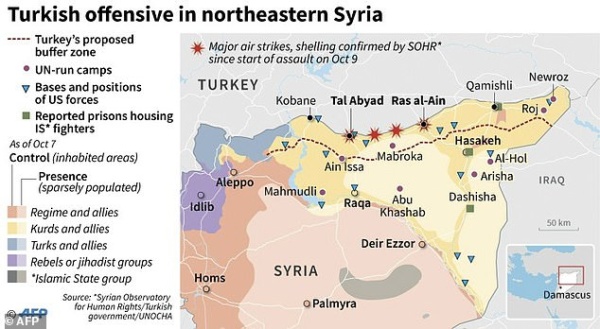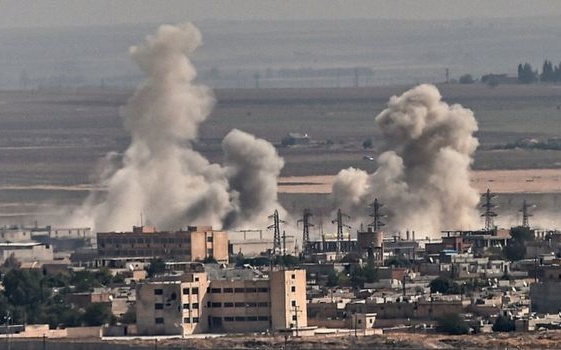Smoke rises from the Syrian border town of Ras al-Ain after Turkish bombardment (AFP)
UPDATE, 2300 GMT:
US Defense Secretary Mark Esper said in a televised interview on Sunday morning that the 1,000 American troops will withdraw from northern Syria.
Esper told CBS News that the US was “likely caught between two opposing advancing armies” — Turkey and the Russian- and Iranian-backed Assad regime in a “very terrible situation”.
He said the US learned that Turkey is likely to expand its incursion “farther south than originally planned and to the west”, presumably a reference to operations outside the “safe zone” initially declared by Turkish President Recep Tayyip Erdoğan.
The Defense Secretary said the decision was made on Saturday night in a meeting with Donald Trump and national security advisors.
Trump ordered the withdrawal of the US troops last December, after a call with Erdoğan. However, the Pentagon pushed back to retain about 1,000 American soldiers — half alongside the Kurdish-led Syrian Democratic Forces and half at a base in Tanf in eastern Syria on the Iraq border.
Esper said Sunday, “We didn’t sign up to fight the Turks on [the Kurds’] behalf. And we’ve been very clear with them about that.”
UPDATE, 2230 GMT:
Kurdish officials claim about 700 Islamic State fighters and family members escaped from a detention camp after nearby Turkish airstrikes.
A member of the Kurdish-led regional authority, Ciya Kurd, said that the ISIS flag had been raised between the camp in the town of Ain Issa and the Turkish border 20 miles to the north.
“We are facing very fierce attacks and we’re forced to decrease numbers of guards,” he declared.
US officials said American troops are withdrawing from Ain Issa in the face of the 5-day Turkish offensive.
The town was on the major supply line for the 1,000 US troops in Syria.
The Turkish Defense Ministry said its troops and Syrian rebels have occupied Ras al-Ain: “As part of the successful operations being conducted in the framework of Operation Peace Spring, the town of Rasulayn, located east of the Euphrates Rivers, has been brought under control.”
Kurdish officials disputed the claim. Marvan Qamishlo, an official of the US-supported Syrian Democratic Forces, said Turkish-backed rebels entered one neighborhood of Ras al-Ain after hours of heavy Turkish shelling that forced a “tactical retreat”.
The initial wave of the cross-border assault, launched Wednesday, has been on the area near Ras al-Ain and the town of Tel Abyad.

Map: Daily Mail
The Turkish military announced its first casualties in the operation, with three soldiers killed and three wounded. It claimed on Friday that 399 “terrorists” — fighters of the Kurdish YPG militia — have been slain, wounded, or captured, and said Saturday that 18 villages had been taken.
International criticism continued against the offensive. The Arab League called for UN Security Council action. France said it “has decided to suspend all plans to export to Turkey weapons that could be used”, and Germany banned some exports.
European Union foreign ministers will meet on Monday in Luxembourg.
Russia’s Vladimir Putin, in his first statement on the offensive, implicitly criticized Turkey despite cooperation with Ankara over Syria since August 2016.
Putin told Russian State media that foreign military forces “present illegally” inside Syria should leave.
But the Erdoğan Government stood firm. Foreign Minister Mevlüt Çavuşoğlu dismissed an offer by Donald Trump — who triggered Ankara’s operations by accepting this in a Sunday phone call with Turkish President Recep Tayyip Erdoğan — to mediate.
“We don’t mediate, negotiate with terrorists. The only thing to be done is for these terrorists to lay down arms,” Çavuşoğlu said.
Çavuşoğlu also said Turkey is not concerned about US sanctions, a day after Treasury Secretary Stephen Mnuchin said Donald Trump had signed an order for punishment if Ankara targeted “civilians, civilian infrastructure, and ethnic or religious minorities”.
The Foreign Minister asserted, “If Turkey was afraid of sanctions, we would not have started this operation. This is a vital national security issue for us.”
He declared that Turkey will “respond tit-for-tat” to any US measures.
SDF: “Turkish Invasion Has Revived ISIS”
The Syrian Democratic Forces reiterated that the Turkish offensive will assist the Islamic State, after the SDF removed the group from northeast Syria in March.
SDF official Redur Xelil said in a televised statement, noting car bomb attacks in two cities which have been blamed on the Islamic State
The Turkish invasion is no longer threatening the revival of Daesh, rather it has revived it and activated its cells in Qamishli and Hassakeh and all the other areas. We are now fighting on two fronts: one front against the Turkish invasion and a front against Daesh.
He urged “allies” to carry out “moral responsibilities” and institute a no-fly zone.
The SDF said Friday that it can no longer be responsible for guarding about 90,000 ISIS fighters and their families in camps in northeast Syria. It claimed five fighters escaped after nearby Turkish shelling.
Kurdish police said on Saturday that a car bomb exploded outside a prison in Hasakeh where Islamic State members are being held.


“Marvan Qamishlo, an official of the formerly US-supported Syrian Democratic Forces …”
FTFY